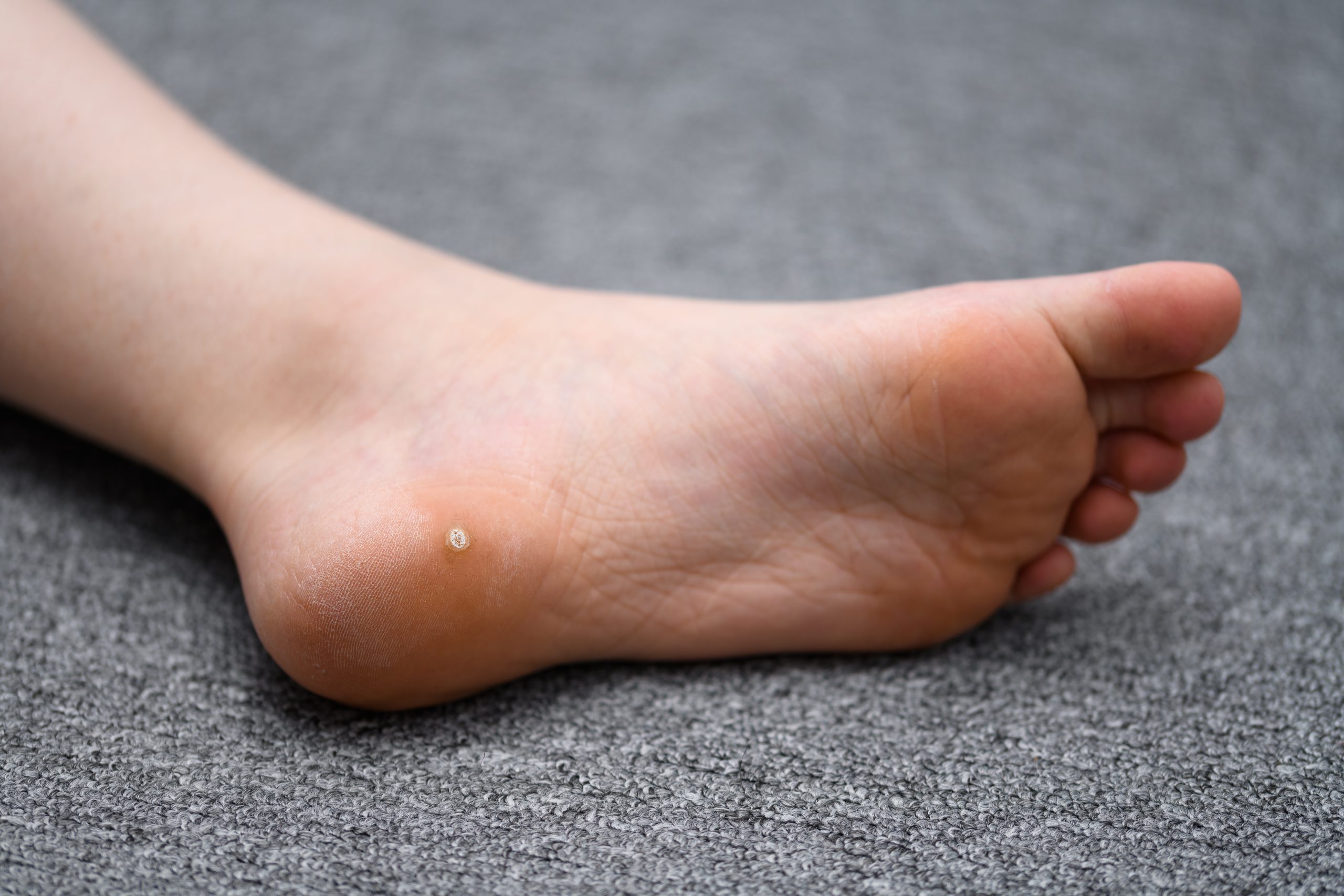Essential oils are rich in therapeutic properties that can cleanse the body of toxic substances and boost the body’s nutrition and immune system. [4] These oils may be effective in reducing the symptoms of celiac disease.
Celiac disease is a gluten-sensitive enteropathy. Some people call it sprue or coeliac. This immune reaction happens after eating gluten, a protein found in wheat, barley, and rye. [3]
Almost 1% of the American population suffers from celiac disease. And nearly 6% of them have a less defined gluten sensitivity condition. [2]
For people with celiac disease, eating gluten triggers a response in the immune system. [1] [2]
This reaction damages the small intestine’s lining and prevents the absorption of some nutrients (malabsorption) over time. [7]
The intestinal damage often causes diarrhea, weight loss, fatigue, bloating, and anemia. [8]
Celiac disease may result in some severe health complications.
Malabsorption can affect the growth and development of children. [10]
There isn’t any cure for celiac disease. But following a strict gluten-free diet may help manage the symptoms and promote intestinal healing for most people.
Keep reading this article to learn more about the efficacy and uses of essential oils for celiac disease, plus its causes, symptoms, and forms.
Best Essential Oils for Celiac Diseases
Pure essential oils come from plants and have some immune-boosting and cleansing properties. This is why essential oils may support a celiac disease affecting the body. [17]
Essential oils can also help the body recover more efficiently as the body makes a transition to a gluten-free diet.
These oils can be mixed or used separately to help with celiac disease. Ginger, Fennel, and Coriander essential oils are famous for assisting patients in easing stomach discomfort. [18]
On the other hand, Peppermint, Tarragon, Anise, and Caraway essential oils aid digestion, provide relaxation to the patient’s muscles and assist with digestion.
On top of providing relief from celiac disease, this blend of essential oils can aid in motion sickness, indigestion, heartburn, and many other digestive issues. [19]
1. Peppermint Oil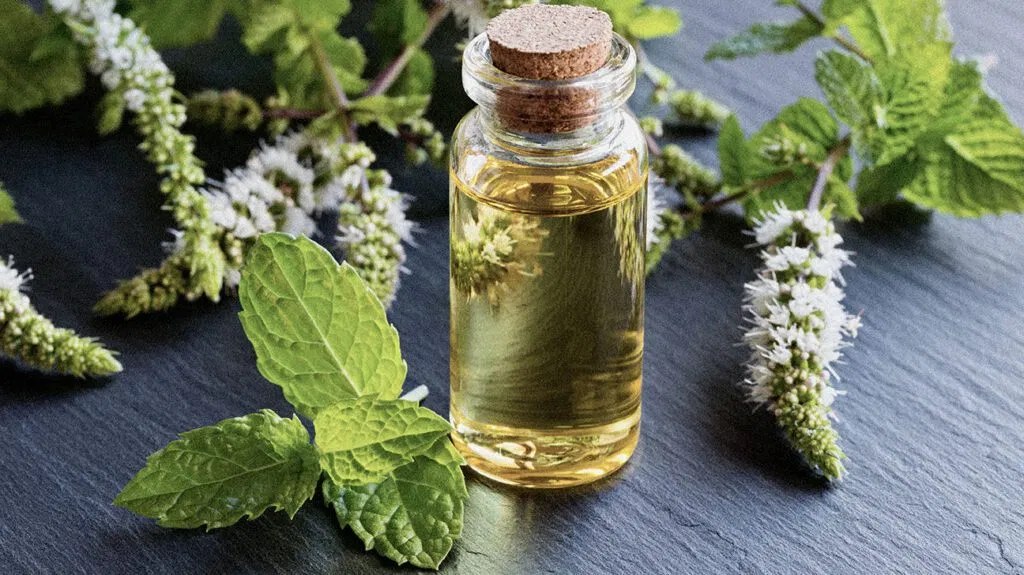
Peppermint essential oil has varieties of uses. That’s why it’s no wonder this oil is a necessity in many people’s medicine cabinets.
Peppermint essential oil indeed does much more than freshening up breaths. It’s used to soothe stomach issues, indigestion, and nausea. [20]
This oil perks the senses up before a long meeting and may cool overworked muscles because of the menthol.
Fortunately, peppermint can also help to clear congestion and headaches and tackle symptoms from PMS.
It may be used to treat celiac diseases as well.
Peppermint is one of the ancient herbs that soothe digestion. Peppermint oil is helpful for digestion. [21]
This oil has the carminative property of expelling gas. It removes gas from the stomach or intestine to relieve flatulence, abdominal pain, and distension.
How to use peppermint oil for curing celiac disease naturally:
- Drinking mint tea has been the antidote to an upset stomach for generations
- Try aromatherapy by using a candle lamp diffuser with peppermint essential oil
- Apply on the neck and the shoulders every day to keep energy levels up during the day
- To boost your mood and reduce fatigue, inhale.
- Massage a few drops of peppermint essential oil on your abdomen, then place a reduction on your wrists or inhale to soothe nausea from celiac disease.
RELATED: Peppermint Oil for Hair: 8 Reasons to Use
2. Lavender Oil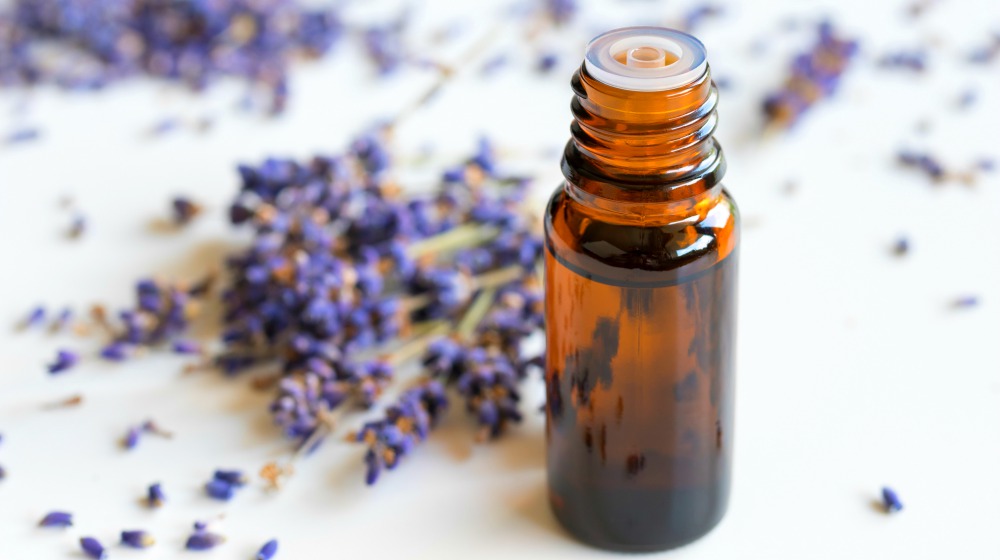
Historically and today, modern aromatherapy texts advocate for lavender essential oil use as an antibacterial essential oil. [22]
Lavender leaves and stems of the plant were used to prepare medicine against the digestive system, many diseases, and rheumatism.
People in the past have valued lavender for its cosmetic purposes. For example, the Romans used lavender oil to take baths, cook, and purify the air.[22]
In the Bible, lavender oil was considered among the aromatics used for anointing and healing.
Lavender oil has versatile properties; this oil is gentle enough to apply directly to the skin.
For generations, the lavender essential oil has been used to treat neurological issues such as migraines, stress, anxiety, and depression. [22]
It also helps patients having an adverse reaction to gluten to treat their celiac disease.
How to use lavender oil for celiac disease::
- It would help if you had a few drops of lavender essential oil. First, rub it in between your palms. Then inhale deeply to help alleviate the symptoms of celiac disease.
- Combine Lavender oil with a nut or vegetable carrier oil. For example, coconut, sesame, etc. Then use topically on celiac diseases.
- Rub 3-4 drops of lavender essential oil in your cupped palms. Use the inhalation method to calm your nerves.
RELATED: Lavender Oil for Hair Problems: 5 Ways to Use It
3. Fennel Oil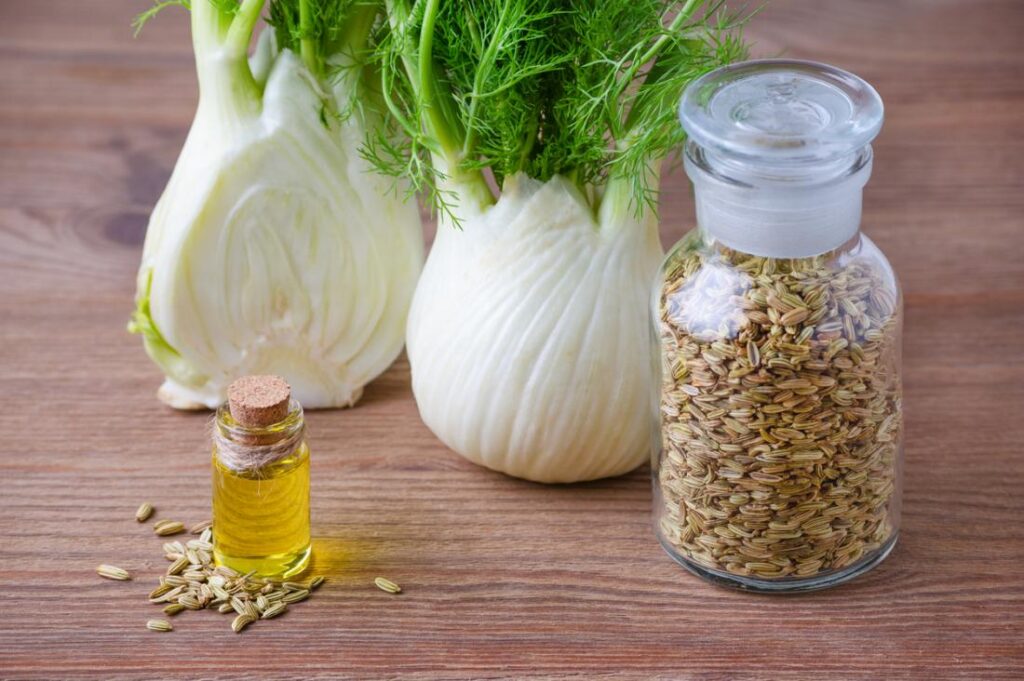
Fennel essential oil has gained popularity as a potent ingredient for good digestive health. It has a licorice-like flavor and an aroma like its root plant. [23]
This oil originates from crushing the seeds of the fennel plant, then going through a process of steam distillation.
Fennel essential oil is an antiseptic. It may help reduce and eliminate gut spasms. This oil also helps prevent gas and bloating. [23]
Fennel has purifying and detoxifying effects on the body. It is an expectorant, a natural laxative, and even a mouth freshener!
Even though essential fennel oil has a strong licorice taste, it works excellent for celiac disease patients. It provides phenomenal digestive support to the body. [23]
Fennel essential oil may help the patient to find balance in his diet.
How to use essential fennel oil for curing celiac disease naturally:
- Put one drop of fennel essential oil on the toothbrush when brushing. It will help to fight sweet tooth cravings and provide antimicrobial benefits for the gums.
- Try aromatherapy by using a candle lamp diffuser with essential fennel oil
- Add two to three drops in a glass of warm water or a cup of chamomile tea for an upset stomach
- Massage a few drops of fennel essential oil on your abdomen, then place a reduction on your wrists or inhale to get relief from celiac disease.
RELATED: 14 Benefits of Fennel Tea You Don’t Want to Miss Out on
4. Ginger Oil
Ginger is a beneficial flowering plant from the family Zingiberaceae; the roots of ginger are widely used as a spice. [24]
For generations, people have used ginger in folk medicine for thousands of years. Because of its excellent digestive properties, ginger is a significant part of Asian cuisines.
Ginger is most commonly added to meals, including meat. It can aid digestion.
Ginger root, as well as the ginger essential oil, are gaining immense popularity for their preservation and also flavoring capabilities.[24]
Now ginger essential oil is used worldwide to treat nausea, upset stomach, inflammation, menstrual disorders, and respiratory conditions. When used as aromatherapy, it is also helpful to bring on feelings of courageousness and even self-assurance.
And this is why it’s known as “the oil of empowerment.”
Ginger essential oil is considered one of the best natural remedies for colic, spasms, indigestion, diarrhea, and stomach aches.[24]
Ginger essential oil is also beneficial when used as a natural nausea remedy and to treat vomiting.
The ginger essential oil has analgesic activity. Therefore, it may help people to relieve pain immediately after surgery.
How to use ginger essential oil for celiac disease:
It’s crucial to test skin sensitivity before using ginger oil.
- Put 2–3 drops in water to help with celiac diseases
- Rub a few drops of ginger essential oil on your stomach or bottom of the feet to aid digestion
- Inhale ginger essential oil directly from the bottle. You can also massage over the lower abdomen
- Use ginger oil aromatically or topically to the solar plexus, which is the upper abdomen of your body. This will stimulate strength and responsibility.
RELATED: 10 Health Benefits of Ginger Oil That You Should Know About
5. Anise Oil
Indians have used anise seeds as a mouth freshener and digestive agent for centuries.
Anise essential oil works as a fantastic digestive aid, which stimulates digestion.
This benefit makes it effective in helping people who suffer from slow digestion problems.
Celiac disease patients may benefit from anise essential oil for its potent digestive properties. [25]
Recommended Directions for using anise oil for celiac disease:
- Topically massage in the stomach muscles, inhalation during respiratory illness.
- Add some anise essential oil into a glass of water, then drink it after consuming a hefty meal.
- Rub 3-4 drops of anise essential oil in your cupped palms. Use the inhalation method to calm your nerves.
Symptoms of Celiac Disease
Celiac disease is quite difficult to diagnose as it affects people differently. Over 200 celiac disease symptoms known to medical professionals may occur in the digestive system and other parts of the human body. [12]
Some people can develop celiac disease as children, others as adults. No one knows the reason for this yet.
Some people who have celiac disease have absolutely no symptoms. They can still test positive on the blood test for celiac disease. [12]
In rare cases, some may show a negative result in the blood test but even have a positive intestinal biopsy.[12]
Whether or not they display symptoms, every patient with celiac disease is at risk for many long-term complications.[13]
Adults are less likely to develop some digestive symptoms. Only one-third of the patients experience diarrhea. [13]
Here are some signs people are more likely to have celiac disease:
- unexplained iron-deficiency anemia
- bone or joint pain
- fatigue
- seizures or migraines
- infertility or recurrent miscarriage
- arthritis
- depression
- anxiety
- canker sores inside the mouth
- missed menstrual periods
- osteoporosis or osteopenia (bone loss)
- peripheral neuropathy ( tingling, pain, or numbness in the hands or feet)
- liver and biliary tract disorders (fatty liver, transaminitis, primary sclerosing cholangitis, etc.)
- dermatitis herpetiformis (itchy skin rash)
Some Forms of Celiac Disease
There are two types of celiac disease: classical and non-classical. In the case of classical celiac disease, patients have symptoms and signs of malabsorption.
This includes diarrhea, weight loss, steatorrhea (pale, foul-smelling, fatty stools), or growth failure in children.
In the case of non-classical celiac disease, a patient may have some mild gastrointestinal symptoms without any apparent signs of malabsorption. The patient may have seemingly unrelated symptoms as well. [14]
Non-classical celiac disease patients may suffer from some abdominal distension and pain and other symptoms like iron-deficiency anemia, peripheral neuropathy (tingling, numbness or pain in hands or feet), chronic fatigue, chronic migraine, unexplained chronic hyper-transaminasemia, vitamin deficiency (folic acid and B12), reduced bone mass and bone fractures, and late menarche/early menopause. [15]
They may also have unexplained infertility, anxiety, dermatitis herpetiformis (itchy skin rash), dental enamel defects, depression, etc.
The silent celiac disease is also called asymptomatic celiac disease. In these cases, patients do not complain of any symptoms. But they experience villous atrophy damage in their small intestine.
Various studies show that even though some patients thought they had no symptoms at all, after going on a rigorous gluten-free diet, they reported better health and a significant reduction in acid reflux, abdominal bloating, distention, flatulence, etc.[16]
There are some ways through which celiac disease can affect patients. They are combined with a lack of training in medical schools, primary care residency programs, etc., contributing to the poor diagnosis rate in the United States.[15] 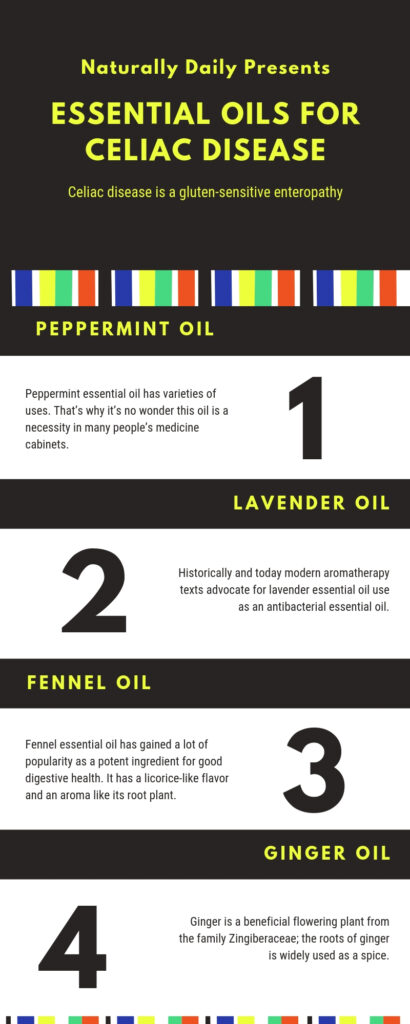
Bottom Line
Our diets today contain a lot of processed foods that are full of gluten.
Celiac disease is a medical condition that causes an immune reaction to eating gluten. [1]
Wheat, barley, and rye- are the standard gluten offenders.
The therapeutic values of essential oils may soothe the discomfort and symptoms of celiac disease. However, it is recommended to contact a medical professional if these symptoms are recurrent or persistent.
The essential oils for celiac disease may support complementary treatments and traditional medications.
READ NEXT: How to Get Rid of Indigestion Fast: 19 Home Remedies


